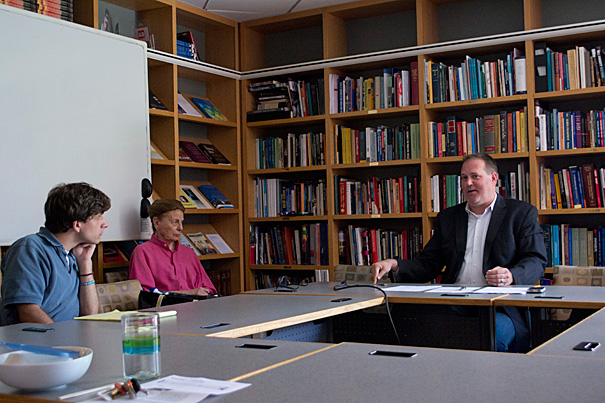
Activist and Harvard Kennedy School (HKS) lecturer Tim McCarthy (right) discussed the pervasive stigma against sexual minorities, both in the United States and abroad, with Philip Hamilton (from left), a recent Wheaton graduate working with the Carr Center, and Dorothy Zinberg, an HKS lecturer in public policy.
Thomas Earle/Harvard Staff Photographer
Progress, but no letup
‘Equal rights does not necessarily mean equal lives,’ says LGBT activist
From the repeal of the military’s “don’t ask, don’t tell” policy, to the expansion of marriage rights in several states, to the passing of a federal hate crimes prevention act, the past several years have been a time of unprecedented progress for lesbian, gay, bisexual, and transgender (LGBT) Americans.
But beyond legal and legislative victories, Tim McCarthy believes, lies a much bigger challenge for the LGBT movement: confronting and eradicating a pervasive stigma against sexual minorities, both in the United States and abroad.
“Equal rights does not necessarily mean equal lives,” McCarthy, an activist and Harvard Kennedy School (HKS) lecturer, told an audience at the Carr Center for Human Rights Policy on July 11. “We always have to keep an eye on the bigger prize.”
Although political objectives can be tackled incrementally — via a “celebrity death match between court cases and ballot initiatives” that seek to either limit or expand LGBT rights — understanding stigma against whole groups is considerably more complicated. It’s a problem that McCarthy and the nonprofit he co-founded three years ago, Face Value, have been tackling with a unique approach: social activism supported by social science research. (Face Value funds its work with a $730,000 grant from the Ford Foundation, one of the largest awards the organization has given to support sexuality research and LGBT issues.)
The project’s work thus far, conducted by academics and graduate students around the country, provides insights into how straight and gay individuals view one another, how LGBT people view their own experiences, and how perspectives from both sides could be better conveyed in the hope of improving “lived experience” for people of all sexual identities, McCarthy said.
In one white paper, cognitive linguists analyzed all public service announcements for state-level ballot initiatives that dealt with LGBT issues, such as gay marriage, gay adoptions, or the inclusion of LGBT history in school curricula. Surprisingly, they found that LGBT individuals were better represented in ads that opposed expanding gay rights than in those that supported the cause.
“We’re actually absent from our own advocacy,” said McCarthy, who is gay and was married in Massachusetts last year. The implication, he said, is that the LGBT community will win support only “when we’re not visible, when our presence is downplayed or obfuscated.”
What advocacy groups are missing, he said, is the opportunity to create their own narratives of the LGBT experience. In another Face Value study, researchers have been asking gay and straight participants to discuss their ideas of how the other group lives —and then sitting both groups down in a room to discuss their conceptions and misconceptions.
What they’ve found, McCarthy said, is that there’s much more room — and need — for dialogue than most LGBT advocates assume. “Both groups are really interested in one another’s lives, but they significantly misunderstand one another’s lives,” he said.
Face Value is also studying different narratives of bullying awareness campaigns: those that portray survivors of bullying as heroes, those that portray them as victims, and those that adopt the “It Gets Better” goal of a good life free from bullying. They hope to determine whether certain types of messages inspire more support for anti-bullying measures than others.
“We’re trying to get a sense of the relationship between empathy and sympathy,” McCarthy said. “We think that that distinction, which often gets occluded, is something that has a significant impact on the way that people support policies and people.”
This fall, Face Value will conduct the first-ever quality-of-life survey of LGBT individuals, to be part of a longitudinal study of the mental, physical, financial, social, and political health of sexual minorities relative to heterosexuals.
With feedback from people affected by LGBT discrimination, McCarthy said, “our conception of equality and quality of life will begin to be articulated and framed and conceived on our terms, as opposed to the terms of public policy.”
McCarthy, an adjunct lecturer in public policy at HKS, a lecturer in history and literature at Harvard College, and director of the Carr Center’s Sexuality, Gender, and Human Rights Program, called on activists to seize a “take-stock moment for the LGBT movement.”
Although it’s important to celebrate advances, LGBT advocates must now turn their attention to “the enduring stigma that is rooted in homophobia, biphobia, and transphobia, that is very much alive and well,” he said. The numbers paint a bleak portrait: Hate crimes against transgender people have actually increased since the passage of the Shepard-Byrd Hate Crimes Prevention Act in 2009, he said. In New York, 40 percent of homeless youth are homosexual, many forced out of their homes with nowhere else to turn.
If public policy victories are not translated “into lived experience of equality among the very people that those policies and pieces of legislation are meant to protect, then our claims of equality within the realm of rights and public policy mean nothing,” McCarthy said.





